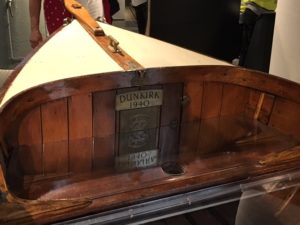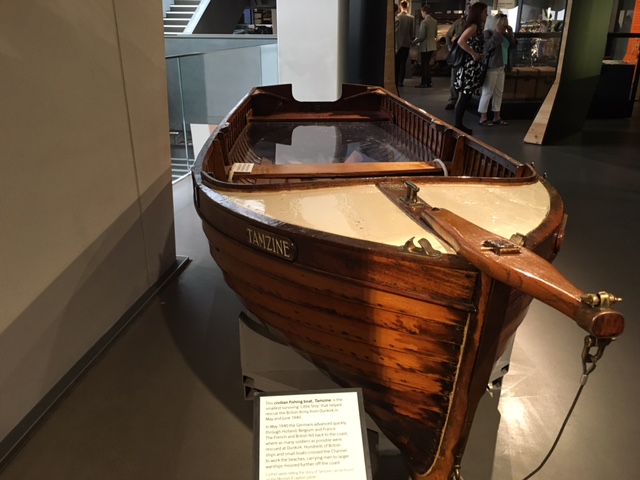Last July my wife and I went to the UK for my graduation from Cardiff. While we were there I couldn’t resist visiting the Imperial War Museum (Julie graciously came along and humored me!) I have always been fascinated by the history of World War II, the great moral and political issues that were at stake, and the incredible valor of “the great generation” in saving democracy in the west from totalitarian regimes in Germany, Italy and Japan. The Imperial War Museum did not disappoint me. But there was one exhibit in particular that caught my eye—the smallest boat that evacuated beleaguered troops from the beaches of Dunkirk, the Tamzine.

The boat is not much for the eye. It’s hard to imagine how it survived the constant strafing of British troops from the Luftwaffe as they faced almost certain annihilation on the beaches of Dunkirk. Bravely it forged through the surf, this little boat, carrying not many troops back to the bigger warships that lay offshore. But with every life it saved it gathered another soldier to fight on. Again and again it returned to those beaches and, miraculously, it survived. I can only imagine that its pilot drew courage from the flotilla of other ships, small and large, that braved those same beaches.
Dunkirk has been an enduring metaphor for our own formation as the Anglican Church in North America. It was Archbishop emeritus Robert Duncan who first drew upon those beaches. In many ways here in North America, we felt as if we were facing annihilation– from lawsuits by The Episcopal Church and the Anglican Church of Canada, by the refusal of so many erstwhile orthodox bishops within TEC and ACoC to guard the discipline and order of the Church, by the refusal of the Instruments of Communion to take any meaningful action against TEC and Canada. We faced the betrayal of the much hoped for Anglican Covenant by the Archbishop of Canterbury himself at the Anglican Consultative Meeting in Kingston Jamaica (2009) as he intervened to table the section on discipline. All hope seemed lost.
But we had a flotilla of ships come to rescue us! Some were big—Like the Church of Nigeria. Other were a bit smaller—Uganda, Kenya and Rwanda come to mind. Others were very small—like Bolivia and the Southern Cone. But they came as brothers and sisters in Christ, fellow Anglicans, to rescue us from the beaches of extinction. For a while they carried us in these various boats. We learned to appreciate deeply the size, and the architecture of the boats, and the mission and faith of the people who piloted those boats. They gave us hope. They rescued us. But more than that, they inspired us to remember why we are in the fight (Matthew 28:16-20 and Ephesians 6:13). We came to love them deeply, and to find what it means to be “in communion” when you are under fire and you need to stand, shoulder to shoulder, with friends who have come far away to stand with you and remind you where home really lies. They reminded us that mission is not about holding on to “stuff” (like buildings) but rather saving souls. In their poverty they shared with us the riches of the Gospel of Jesus Christ, and the power of the Holy Spirit.
And they taught us that even when paddling in the right direction, for the right cause, rescue boats never fire upon each other. Yes, there may be disagreements—even sharp ones—about the pace and the size and the order of the boats. But we row together. We do not fire upon each other.
Eventually we came to safer shores and they encouraged us to get out of our boats and build one boat together. All along the way they reminded us from the East African Revival that “if we walk in the light as he (Christ) is in the light, we have fellowship with one another, and the blood of Jesus cleanses us from all our sins!” (I John 1:7-8) With their blessings and prayers, their counsel and a bit of guidance, we built that single boat together. A few points along the way they even refereed some disagreements! That’s what brothers and sisters in Christ do. With their congratulations we launched that boat in July 2009 as The Anglican Church in North America. We built it big enough so that it could hold more people than we could ever imagine, as we dreamed of planting 1,000 new churches.
We still have a long way to go, but we are now at sea. We too are on a mission– and if ever our small boat can be of assistance to Anglicans in distress, we will be there.
Count on it.
The Rev. Canon Phil Ashey is President & CEO of the American Anglican Council.



